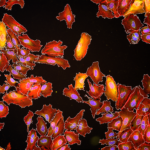Lien vers Pubmed [PMID] – 19575658
Annu. Rev. Cell Dev. Biol. 2009;25:649-70
Listeria monocytogenes is an intracellular bacterial pathogen that promotes its internalization within nonprofessional phagocytes by interacting with specific host cell receptors. L. monocytogenes resides transiently in a membrane-bound compartment before escaping into the host cell cytosol where bacterial proliferation takes place. Actin-based motility then promotes cell-to-cell pathogen spread. Extensive studies on cytoskeleton rearrangements, membrane trafficking, and other events have established this microorganism as an archetype of cellular function subversion for intracellular parasitism. Here we discuss the most significant membrane trafficking pathways hijacked by L. monocytogenes during the host cell infection process and compare them to those of other intracellular pathogens, in particular Shigella flexneri, Salmonella enterica, and Mycobacterium tuberculosis.



